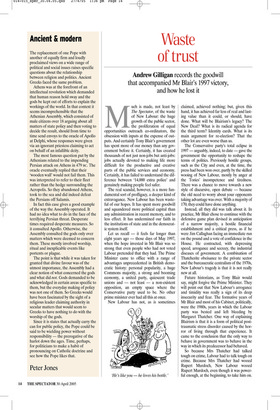Ancient & modern
The replacement of one Pope with another of equally firm and loudly proclaimed views on a wide range of political and social issues raises specific questions about the relationship between religion and politics. Ancient Greeks faced the same problem.
Athens was at the forefront of an intellectual revolution which demanded that human reason hold sway and the gods be kept out of efforts to explain the workings of the world. In that context it seems incomprehensible that the Athenian Assembly, which consisted of male citizens over 18 arguing about all matters of state policy and then voting to decide the result, should from time to time send envoys to the oracle of Apollo at Delphi, whose responses were given via an ignorant priestess claiming to act on behalf of an infallible deity.
The most famous question put by the Athenians related to the impending Persian attack on Athens in 479 BC. The oracle eventually replied that their ‘wooden wall’ would not fail them. This was interpreted to refer to their fleet rather than the hedge surrounding the Acropolis. So they abandoned Athens, took to the sea and did indeed defeat the Persians off Salamis.
In fact this case gives a good example of the way the Assembly operated. It had no idea what to do in the face of the terrifying Persian threat. Desperate times required desperate measures. So it consulted Apollo. Otherwise, the Assembly consulted the gods only over matters which were deemed to concern them. These mostly involved worship, ritual and inexplicable events like portents or plague.
The point is that while it was taken for granted that divine favour was of the utmost importance, the Assembly had a clear notion of what concerned the gods and what did not. Gods demanded to be acknowledged in certain areas specific to them, but the everyday making of policy was not one of them. So Greeks would have been fascinated by the sight of a religious leader claiming authority in secular matters that would seem to Greeks to have nothing to do with the worship of the gods.
Since it is states that actually carry the can for public policy, the Pope could be said to be wielding power without responsibility — the prerogative of the harlot down the ages. Time, perhaps, for politicians to make a habit of pronouncing on Catholic doctrine and see how the Pope likes that.




















































 Previous page
Previous page